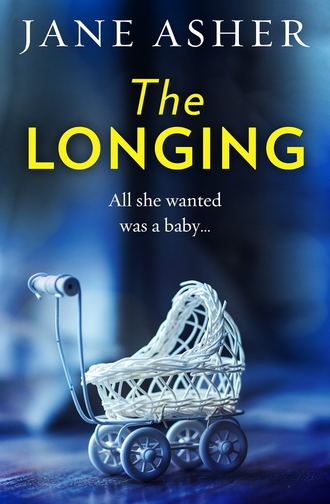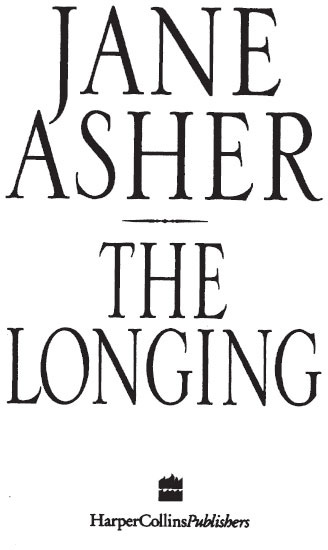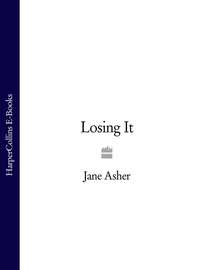
Полная версия
The Longing: A bestselling psychological thriller you won’t be able to put down


Copyright
The characters and events in this book are entirely fictional. No reference to any person, living or dead, is intended or should be inferred.
HarperCollinsPublishers
1 London Bridge Street
London SE1 9GF
www.harpercollins.co.uk
This edition 1997
First published in Great Britain by
HarperCollinsPublishers 1996
Copyright © Jane Asher 1996
Cover design © HarperCollinsPublishers 2017 Cover photograph © Shutterstock.com
Jane Asher asserts the moral right to be identified as the author of this work
All rights reserved under International and Pan-American Copyright Conventions. By payment of the required fees, you have been granted the non-exclusive, non-transferable right to access and read the text of this e-book on screen. No part of this text may be reproduced, transmitted, down-loaded, decompiled, reverse engineered, or stored in or introduced into any information storage and retrieval system, in any form or by any means, whether electronic or mechanical, now known or hereinafter invented, without the express written permission of HarperCollins.
Source ISBN: 9780007571826
Ebook Edition © DECEMBER 2013 ISBN: 9780007571826
Version: 2017-12-18
HarperCollinsPublishers has made every reasonable effort to ensure that any picture content and written content in this ebook has been included or removed in accordance with the contractual and technological constraints in operation at the time of publication.
Dedication
To Gerald
THE LONGING
Celebrated British actress of stage and screen, Jane Asher is also well known for her many other activities, especially her non-fiction books and journalism and her successful cake making business. The Longing is her stunning debut novel, and was published in hardcover to widespread acclaim in 1996. She lives in London, with her husband and three children, and is working on her second novel.
Critical acclaim for The Longing:
‘Topical, emotion-charged, [The Longing] grips from the first page and conveys with extraordinary vividness the terrible anguish experienced by couples who cannot start their longed-for baby.’
VAL HENNESSY, Daily Mail
‘A writer who does convey real emotional power . . . The Longing is a story about infertility: the desperation that overtakes couples who can’t conceive and the tragic consequences of that desperation. Like all really good novels, it is true – not in the factual sense, but in the way that its characters seem real and the world in which they move is one we recognise. Even better, its power increases as it goes on, drawing you further into its plot, gripping more tightly with every page . . . if Jane Asher were not already famous, this book would make her so.’
Daily Express
‘Thought provoking, polished and professional, a modern tale of Gothic horror.’
The Times
‘Strong dialogue drives the plot along and short, intercutting scenes add structure and drama.’
TLS
‘Tightly plotted and pacily told.’
Daily Telegraph
‘An absorbing and thought-provoking read.’
Eastern Daily Press
‘A taut psychological thriller . . . she deftly weaves each strand of the very clever plot, keeping the reader tied to every last word.’
Belfast Telegraph
‘Asher undoubtedly has an eye for character. The Longing is a good, if emotionally draining read.’
Punch
‘A celebrity novel from, at last, a celebrity who can actually write them.’
SHERIDAN MORLEY, Sunday Times
Contents
Title Page
Copyright
Dedication
Prologue
Chapter One
Chapter Two
Chapter Three
Chapter Four
Chapter Five
Chapter Six
Chapter Seven
Chapter Eight
Chapter Nine
Chapter Ten
Chapter Eleven
Chapter Twelve
Chapter Thirteen
Chapter Fourteen
Chapter Fifteen
Chapter Sixteen
Chapter Seventeen
Chapter Eighteen
Chapter Nineteen
Chapter Twenty
Acknowledgements
Keep Reading
About the Publisher
Prologue
The effort was exhausting him; instead of getting excited he felt depressed and hopeless. He sighed and stretched his arms out in front of him until his linked fingers cracked at the knuckles, then looked down again at the magazine on his lap, turning the page to be confronted by yet another tight, artificially tanned bottom thrusting uninvitingly up at him, breasts lolling in the background. Instead of making him stiffer, it merely made him despair.
Throwing the magazine back on to the table he stood up, moved over to the line of videos in the small bookcase and scanned the covers in search of inspiration, humming an unidentifiable tune as he turned his head first one way and then another to read the titles. ‘Might be worth a try,’ he muttered to himself as he pulled one out, then slotted it into the open-mouthed recorder and sat back to watch. After a few moments of fascination at the proportions of the girls gambolling on the beach, he realised he had completely forgotten the purpose of it all and had let his mind wander off into thinking how small the little lines must be to fit in six hundred and twenty-five on the screen. ‘Oh, this is ridiculous,’ he said out loud, and blew out his lips in exasperation as he got up and switched off the recorder.
Another tack. He sat on the plastic seat of the nearest chair, leant back against the wall, closed his eyes and thought of Julie, picturing her undressing in the slowly casual way she did when she knew he was watching her. He felt a comforting little twitch of response and persevered. Julie arching her back as she undid her bra, leaning forward to pull down her tights, smiling at him from under her hair as if shy of him after ten years of marriage.
Disappointingly, she was suddenly dressed again and putting the Sunday joint in the oven. He managed to force her clothes off again with a huge effort of will but as soon as she was naked they irritatingly snapped back on again.
He opened his eyes, resisted a strong temptation to look at his watch, and picked up another magazine.
Chapter One
At last Harry was sleeping. After a night of walking the baby up and down, rubbing his back as he struggled against her left shoulder in the seemingly unending battle against colic, Anna had spent much of the morning trying to settle him in his cot. Finally she had given up and decided to go out, hoping that a long journey in the old-fashioned pram would work its usual magic and lull him to sleep. He had still been wide awake and grizzling as she reached the row of shops where she usually stopped, so she had kept going for half a mile or so towards another supermarket where she hadn’t shopped since before his birth three months earlier. He had drifted off only moments before she turned the corner into Streatham High Road, his eyelids closing in spite of himself, his natural curiosity at the extraordinary business of being alive stifled by the irresistible drowsiness produced by the comforting jolting of the pram wheels over the pavement.
She pushed open the heavy glass door of the shop with one hand and manoeuvred the pram inside by pushing it with her body as she gripped the handle and her bag with the other, then stopped in annoyance. It was immediately clear that there would be no chance of the large second-hand pram fitting comfortably back through the checkouts on her way out, and even the narrow aisles, though they were empty of customers, were littered with dump bins carrying special offers, and looked dauntingly difficult to negotiate. Letting the glass door swing shut behind her, she instinctively reached down to pick up the baby, then hesitated as she looked at Harry’s peacefully dreaming face, his brow smooth and untroubled, his eyes gently moving under their pink translucent lids.
‘Oh God, I can’t wake you up again, I just can’t,’ she muttered under her breath. She sighed, then parked the pram just inside the entrance where she could keep half an eye on it, pushing her foot down to lock the brake in place. She bent down and kissed Harry very lightly on a flushed, rounded cheek, then pressed her mouth to his unconscious ear and whispered gently, ‘It’s only a few things. You’re out for hours by the look of you. Won’t be a moment.’
She picked up her bag, collected a trolley and, making her way into the heart of the store, pushed it quickly but without enthusiasm down the aisle, bored by the very idea of the shopping she had to do, and wearied at the tiresome business of having to keep count of every price as she chose the things she needed. The cardboard boxes balanced on the shelves on either side towered over her in depressing brown walls as she collected tins of baby food and baked beans, and she looked away from them and down into the cabinets, where packets of frozen vegetables were piled in their plastic bags, each covered with a thin white film of frost.
She chucked two solid, icy packets of peas on top of the tins then stopped and pulled a small piece of paper from her pocket. ‘Now, what was it I knew I’d forget?’ she muttered as she stood in the middle of the aisle, studying the neatly written list, but with her other hand still firmly holding on to her small fake leather knapsack which she had rested on the handle of the trolley.
She instinctively gripped it even more tightly as a grey-haired woman wearing a padded coat like an eiderdown came round a corner and pushed past her, tutting a little as she did so. Anna looked up at the large pear-shaped figure as she waddled away towards the gravy powders, and threw a disinterested ‘What’s your problem, then?’ after her.
The woman stopped and turned to look back at Anna, whose small figure with spiky jet-black dyed hair, huge earrings and spindly calves, exaggerated by tight, black leggings and loose white shirt hanging down below a thick black jumper, was dwarfed by the mountains of goods on either side. ‘It’s people like you that’s the problem, love,’ she answered. ‘Learn some manners.’
Anna looked down at her list again, murmuring quietly, ‘Oh go fuck yourself.’ But she felt suddenly uneasy and glanced up towards the doorway. Her view was blocked for a moment by a blonde customer in a blue blazer coming through the door, but as the woman moved towards the stacked row of trolleys Anna was reassured by the sight of the pram still sitting where she had left it. She stuffed the list in her pocket and headed for the nappies.
Juliet turned back from the trolleys and moved quickly over to the pram. As she looked down she suddenly knew for certain what she had suspected when she had seen it through the large plate-glass window. The baby looked so sweet lying there in his blue baby-gro, so securely tucked in and peaceful that it seemed a shame to move him, but she knew she must. As she bent over the pram she breathed in his warm, milky, almost edible smell and felt her womb contract in sympathy. She pulled back the blue cotton blanket, gently slipped her hands under his armpits and lifted him up confidently on to her left shoulder, letting his head fall softly against the wool of her jacket as she held him with one hand and picked up the blanket with the other. He lifted his head slightly, making it wobble on its red, pleated neck, gave a little whimper and screwed up his eyes, then made a small sucking movement with wet lips before giving a tiny sigh and settling back into a deep sleep.
Juliet smiled to herself as she rubbed the side of her face against the fuzzy head, then pushed open the glass door and made her way quickly out of the shop. She tucked the cover round the baby with her free hand as she moved away from the supermarket and crossed the road, walking purposefully up the street and away from the shops: a tall, striking woman dressed in expensive-looking but creased blazer and trousers, her streaked blonde hair unkempt and wearing no make-up; the very picture of a harassed middle-class mother carrying her young baby.
Nappies were the last thing on Anna’s list, so after picking up a large economy bag of the three-month size, she began to make her way back towards the checkout, but stopped as her eye was caught by a display of chocolate sauces. She stood for a moment or two, adding up once more in her head the prices of the goods already in her trolley and considering half-heartedly whether a squeeze or two of chocolate would cheer up the quarter slab of vanilla ice cream she thought might be left over in the small iced-up freezer compartment of her fridge. In an effort to remember she tried to picture the open fridge but, instead of ice cream, saw the bowl of half-eaten baby cereal she had put there that morning, and started guiltily as it reminded her of Harry. As she turned to move on she glanced over again at the pram by the door and, as she did so, felt a spasm of shock roll up her body in a wave that broke at her throat in a little gasp of fear. She tried to identify what had caused it, and as she stood for a split second still staring at the pram, immobilised by anxiety, suddenly knew. It had moved. Only the smallest amount, but to Anna’s eye the change in angle was unmistakable. Unsure why this filled her with such foreboding, and praying that it had simply been knocked a little by a passing shopper, she left the trolley and raced down the aisle, her brain at first refusing to make sense of what her subconscious saw more clearly every second.
The baby’s face had changed colour.
It was flatter, creased – frightening.
By the time she recognised the empty bottom of the pram for what it was, she was screaming.
Michael Evans’ progression up the insurance firm where he had worked since leaving university had been fast and impressive, and the acquisition of a beautiful, clever wife at the age of thirty-four – a wife (as Michael hated himself for admitting he was a little impressed by) a notch or so above him in the social scale – had fitted neatly into a relatively smooth, happy and uneventful life. His Englishness, his emotional restraint – at that time enough to make some doubt that feelings of any real strength lurked under the dignified, correct exterior – attracted Juliet by its appearance of calmness and solidity. A man of few words, her mother had called him, not altogether disparagingly, and Juliet had loved that in him. His habit of thinking long and hard before replying to even the simplest question, bowing his head and placing his hands together against his lips like a praying saint in a mediaeval triptych, had amused her, and the reply that would eventually emerge was invariably coloured by a kindness and consideration for the questioner that contrasted comfortingly with Juliet’s less serene and more dissatisfied outlook on life. At their first meeting at a party in Kensington they had quickly homed in on each other, her elegant beauty and apparent confidence thrown up in shimmering relief against the background of city suits, sensible ties and brightly coloured frilled cocktail dresses that could have gone straight on to enjoy a few dances at Annabel’s before being gently but purposefully unzipped to allow a good grope in the taxi on the way home. Juliet’s naturally blonde hair, bobbed into a swinging, shining pelmet, her white silk suit and expensive but understated jewellery spoke of subtler and ultimately more satisfying delights. She looked stunning but – at least in the immediate future – unzippable. Michael was entranced, and she in her turn was drawn to the oasis of peace and wry amusement that he had hollowed out for himself among the loud, over-confident voices around him. They found themselves spending the whole evening together. Several more had quickly followed, including a few outings to the cinema and to small Chelsea restaurants, until there had come a night when, after a visit to the London Coliseum to indulge Michael’s taste for the less demanding operas, hesitant, respectful sex had followed in his small flat in Fulham. It soon seemed easier, and somehow the right thing to do, that Juliet should move in. Marriage followed within the year, and their lives settled into a predictable, comfortable routine.
Michael was a clever, honest and hard-working businessman, and Juliet’s job in an upmarket firm of estate agents was well suited to her good taste and persuasive manner. She was a popular and successful member of the team, but as she and Michael had known from shortly after their first serious conversation that they both wanted children, she only gave it a limited proportion of her attention and effort. She was quite prepared for a time when she would have to set her career aside – at least until the little Evanses were happily ensconced in the obligatory boarding schools – to concentrate on the important tasks of running a good home, nurturing an admirable, high-earning, respectable husband and bringing up a brood of future useful Englishmen – or women.
When they first moved into the neat terraced house in Battersea a few months after their wedding they both mentally set aside a small light room on the top floor as a future nursery, assuming its occupant would arrive within a few years as easily and comfortably as everything else had so far done in their short, enjoyable courtship and marriage. As time went by and no hint appeared of impending offspring, a tiny little feathery sensation of fear began to flutter occasionally deep within Juliet. After some nine years of conventionally happy, sexually active if unexciting marriage, the flutter had become the beat of heavy wings – and Juliet began to admit to herself that something unspeakable was hovering on the edges of her well-planned, smoothly run adult life, threatening to throw it off balance with the strong gusts of unease it created.
Although she herself was becoming increasingly aware of this shadow lurking at the edges of her everyday life, it was the reactions of those around her that made it difficult to carry on as if no problem existed.
Her mother, in particular, made her feel horribly awkward about the lack of babies and, never the most tactful of women, was extraordinarily accurate in pinpointing the most humiliating moments to drop heavy hints about this shortcoming in her daughter’s achievements. Juliet had once made the fatal mistake of quietly admitting to her that she and Michael were disappointed not to have so far produced any children, and she had regretted it ever since, sensing that – behind the show of sympathy and understanding – it had given her mother another little weapon to use against her.
‘Well, after all it’s not as if I had any grandchildren to leave it to when it comes to mine,’ Mrs Palmer volunteered in the middle of a discussion about wills at one of her dinner parties. As the average age of her guests, apart from Michael and Juliet, was as usual somewhere in the seventies, this jolly subject was fairly typical of those raised around the Palmer table.
‘Everyone should make one, of course,’ added Michael, carefully ignoring the reference to his lack of contribution to the family dynasty. ‘It’s surprising how many people don’t bother, and then leave their spouses with the most complicated situa—’
‘Yes, but I don’t have a spouse, you see. My daughter is all I’ve got,’ ploughed on Mrs Palmer, turning to smile sweetly at Juliet as she underlined her point with the subtlety for which she was famous, ‘all I’ve got. Apart from you, Michael dear, of course. It’s not as if there were any young ones to benefit from my savings. I’d always thought there might be schooling and so on to help with, of course. Even my dear dog isn’t with me any more.’
Michael and Juliet had adopted the Palmers’ black labrador three years previously. Mr Palmer’s death had meant a move for his widow from the large house in Hertfordshire to a London service flat, and to keep the family pet would have been impossible. Juliet, hating the idea of giving her away, had begged Michael to let the dog live with them, and in spite of it necessitating complicated arrangements for having her collected by a friend each day while they were at work, he had agreed. But Mrs Palmer saw the transferring of Lucy as entirely to their benefit, and had never once expressed any thanks for their having taken over the responsibility. At the time, Michael and Juliet had put it down to the recent bereavement, but as the years went by and Mrs Palmer still complained self-pityingly about the old dog’s. absence, Juliet found it increasingly irritating.
Her relationship with her mother was an extraordinary mixture of closeness and utter separateness, and it sometimes appeared to her that Mrs Palmer deliberately chose to hurt her in order to re-establish some kind of power over her. Juliet became adept at brushing aside the references to missing grandchildren, not only because she found them disturbing, but also because treating them with any seriousness made the awful possibility of a genuine problem more real.
But the afternoon she caught Michael looking longingly out of the window at some small boys playing football outside the flats that backed on to their house, she knew something must be done. She walked up quietly to stand just behind him, and followed his gaze towards the laughing children.
‘What is it?’ she asked, not needing an answer, but half hoping they could bring the unspoken problem out into the open.
He jumped guiltily when he became aware of Juliet behind him. ‘I was just wondering if I needed an overcoat. It’s clouded over again.’
‘Oh Michael, for heaven’s sake.’
‘What?’
‘You know.’
If Michael was worried enough to protect her from his consciousness of there being something wrong, then Juliet knew it was time she herself turned and confronted it. Later that evening she studied again the magazine articles and chemist’s leaflets that she had hoarded in her bedside drawer.
‘I’ve bought an ovulation thermometer,’ she announced as she came in from work the next day.
‘What?’
‘It’ll give me an idea when I’m ovulating, and we can make an extra effort, if you see what I mean.’
‘I see exactly what you mean. It sounds delightful. I suggest you take your temperature this minute,’ said Michael, as he threw his jacket on to the sofa and began to undo his shirt buttons.
‘Michael, what are you doing?’ laughed Juliet. ‘Don’t be so silly. It isn’t instant like that, as I’m sure you know perfectly well. No, stop it – I want to read the instructions,’ she said as she wriggled out of his grasp and sat down, moving his coat on to the arm of the sofa. ‘Now look – it’s in a sort of huge scale – see? So I can—’




